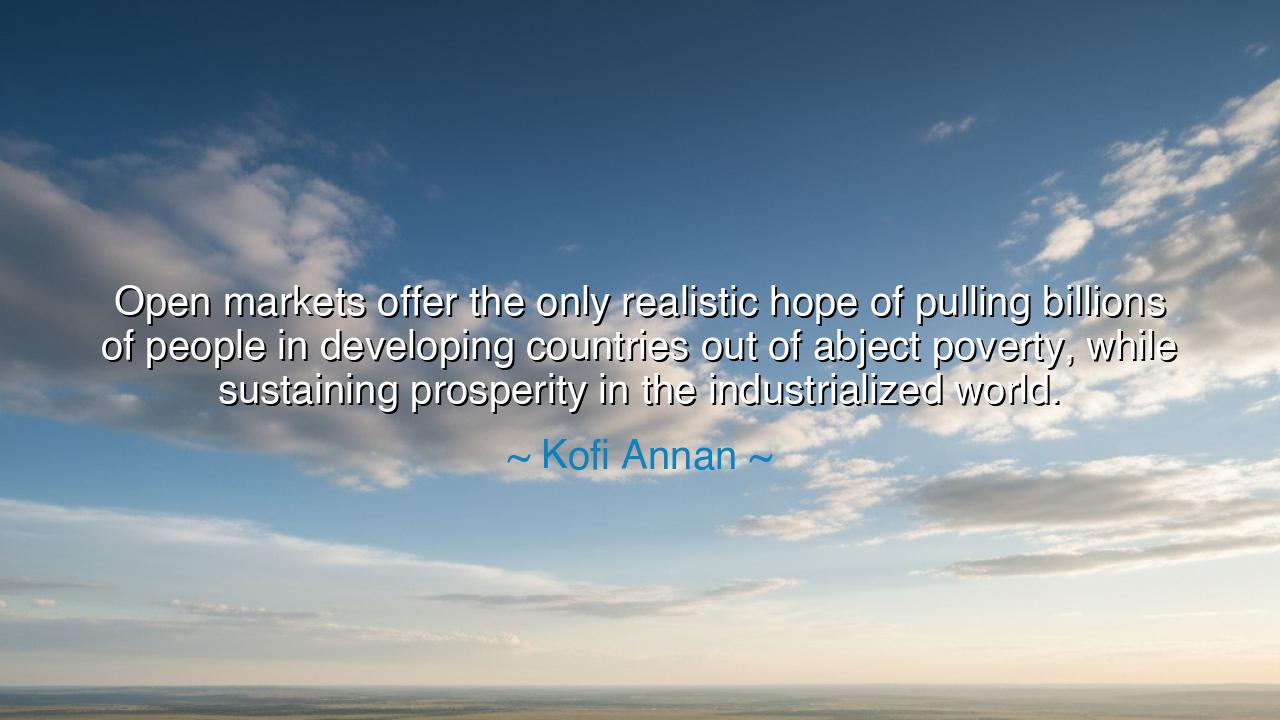
Open markets offer the only realistic hope of pulling billions of
Open markets offer the only realistic hope of pulling billions of people in developing countries out of abject poverty, while sustaining prosperity in the industrialized world.






In the wise and measured words of Kofi Annan, we hear the voice of a man who spent his life striving to bridge the chasms between nations and peoples: “Open markets offer the only realistic hope of pulling billions of people in developing countries out of abject poverty, while sustaining prosperity in the industrialized world.” These words, spoken not as mere policy, but as moral vision, reflect Annan’s deep belief in the interconnectedness of humanity—that the fate of the rich and the poor, the powerful and the powerless, are bound together by invisible threads of trade, cooperation, and shared responsibility. He reminds us that in a global age, prosperity cannot remain the privilege of the few; it must become the inheritance of the many.
The origin of this quote lies in Annan’s tenure as Secretary-General of the United Nations, where he sought to create not only peace among nations, but justice within the global economy. His words were shaped by the late 20th and early 21st centuries, when globalization transformed the world into a single marketplace of ideas, goods, and opportunity. He saw how trade could become a ladder—lifting entire societies from despair to dignity. But he also saw the danger: that if the ladder were pulled away or blocked by inequality, protectionism, or greed, billions would remain in darkness. Thus, Annan spoke these words as both a call to hope and a call to conscience—urging nations to open not only their markets, but their hearts.
To say that “open markets offer the only realistic hope” is to recognize both the power and the peril of economic freedom. Throughout history, nations that embraced openness—of trade, of innovation, of cooperation—rose from poverty to strength. Consider the transformation of South Korea after the devastation of war. Once among the poorest lands on earth, it opened itself to trade, education, and global partnership. In a few short decades, it became a thriving democracy and one of the world’s leading economies. Factories became laboratories; hardship became opportunity. This is the promise Annan saw—the ability of open markets to turn the dream of progress into the reality of prosperity.
Yet Annan’s wisdom also carries a warning. Open markets must not become open wounds—places where exploitation replaces fairness, and wealth flows only in one direction. He knew that markets, left unguided by ethics, could deepen inequality rather than heal it. For him, trade was not merely an exchange of goods, but of dignity—a covenant among peoples that required honesty, transparency, and compassion. A market that thrives on injustice or corruption destroys the very foundation of its promise. Therefore, Annan’s vision was not of blind capitalism, but of balanced globalization—where opportunity is shared, and progress uplifts the many rather than enriching the few.
His words also reflect a profound understanding of mutual dependence. The prosperity of the industrialized world cannot endure in isolation. When the poor remain destitute, disease spreads, conflicts arise, and instability ripples across borders. The wealth of one nation is tied to the well-being of all. Annan saw this truth clearly: that the strength of the world lies not in division, but in unity. He understood that a rising tide must lift every boat, or else the sea of humanity will grow stormy and unforgiving. In his wisdom, he called on the leaders of the world to recognize that their own peace and prosperity depend upon the empowerment of those once left behind.
Consider too the story of Africa’s emerging economies, whose people, once excluded from global trade, have begun to transform their nations through openness and innovation. Entrepreneurs in Nairobi, Kigali, and Accra connect through digital markets that span the continents. Farmers in Ghana sell their cocoa to companies across the sea; artisans in Ethiopia reach buyers in cities they have never seen. These are not acts of charity—they are acts of partnership, proof that when barriers fall, humanity rises. Annan’s dream lives on in these quiet revolutions, in every handshake that crosses borders and every trade that uplifts both giver and receiver.
So, my children, hear the wisdom of this statesman: prosperity must be shared, or it will not last. Open your hearts as you open your markets; seek not only profit, but purpose. Let your labor, your inventions, your enterprises serve not just yourself, but the greater good. For in this world, no nation can stand tall upon the suffering of another. The wealth of humanity is not gold or steel—it is cooperation, the sacred exchange of trust and hope.
Let us therefore honor Kofi Annan’s vision. Let us work for a world where trade is fair, where opportunity is universal, and where every child, born in any corner of the earth, can reach for a better tomorrow. For in the harmony of open hearts and open markets lies the truest form of peace—a peace built not on conquest or power, but on the shared prosperity of all mankind.






AAdministratorAdministrator
Welcome, honored guests. Please leave a comment, we will respond soon